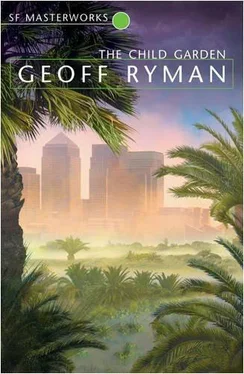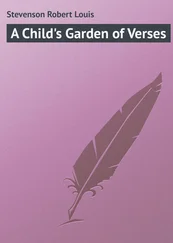Milena was frightened of dying when it happened, like her father. Had he been resistant as well? Her father had died, in Eastern Europe, and her mother had fled with Milena to England, where the diseases were milder. Then she too had died, and Milena had grown up as an orphan in a foreign land.
She had grown up with a head full of theatrical visions. She loved the mechanics of rotating stages, of puppets, of painted flats being raised and lowered. She loved the cumbersome, stinking alcohol lights that blazed with brightness found only in theatre. She thought about such things as the effect of alternating bands of white and yellow light cast over a white, white stage. She loved light. She toyed with hazy ideas of productions that consisted only of light. No people.
At ten years old, Milena had been Placed for work in the theatre, as an actress. This was a mistake. Milena was a terrible actress. There was something unbending in her that refused to mimic other people: she was always herself. She was doomed always to fight to stay herself.
Most mornings, a bus would take Milena to her next performance. She would sit, arms folded, like a flower that had not yet bloomed, and look at London as it creaked past her window.
People called London the Pit, with rueful fondness for its crumbling buildings propped up by scaffoldings of bamboo, for its overcrowding, for its smells. The Pit, they called it, because it lay in a depression, a river valley between hills protected by a Great Barrier of Coral that kept back the rising sea and estuary.
Outside her window, Milena saw women in straw hats smoking pipes and selling dried fish. She saw children dancing to toy drums for cash or pushing trolleys full of dusty green vegetables. Men in shorts bellowed to each other like cheerful bullfrogs, rolling barrels of beer down ramps into basements under the street. Giant white horses stood calmly before the wagons.
People were purple. Their skins were flooded with a protein called Rhodopsin. It had once been found only in the eye. In light, Rhodopsin broke down into sodium, and combined carbon and water.
People photosynthesised. It was a way of feeding them all. There were twenty-three million of them in the Pit. In summer they baked in tropical heat, stretching out in the parks in early morning, to breakfast on light. In the raw and bitter winters, they would lean against sheltered walls and open up their clothing in gratitude. Milena would see them from her bus. Their rippled flesh would be exposed; their swaddlings of black winter clothing would be thrown back. They would look like carvings in baroque churches. Milena would then be made restless with semiological error, desperate with Bad Grammar.
People died in the street. Most mornings, the bus would pass one of them. A man would be stretched out on the pavement, looking back over his shoulder as if in surprise, as if someone had called him. A bell would be ringing dolefully, calling for a Doctor.
And the actors on the bus would go on talking. An actress might laugh too loudly, a finger hooked under her nose, talking to a director; a young man might continue looking at his feet, disgruntled by a lack of success. Does no one care? Milena would think. Does no one care for the dead?
There were no old people in the streets. Young mothers worked the stalls. Their children stirred the food in the sizzling woks, or slammed new heels onto old shoes. The dead were young as well.
The span of human life had been halved. This was not considered to be an advance in medicine. It was considered to be a mistake.
In the days before the Revolution, a cure had been found for cancer. It coated the proto-oncogenes in sugar, so that cancer could not be triggered. In the old world of great wealth and great poverty, the cure had been bought by the rich before being tested. It was contagious, and it escaped. Cancer disappeared.
It had once been normal for the human body to produce a cancer cell every ten minutes. Cancer, it turned out, had been rather important. Cancer cells did not age. They secreted proteins that prevented senescence. They had allowed people to get old. Without cancer, people died in or around their 35th year.
After that, there had been a Revolution.
Milena sat on the bus in her boiled gloves and saw a nervous light in the eyes of the actors, a fervour for accomplishments completed in youth. She saw the unfailing smiles of people in the markets, and the smiles seemed to be symptoms of disease. It seemed to Milena that nearly everything she saw was wrong.
She saw the children. They had been given viruses to educate them. From three weeks old they could speak and do basic arithmetic. By ten, they had been made adults, forced like flowers to bloom early. But they were not flowers of love. They were flowers of work, to be put to work. There was no time.
BOOK ONE
Love Sickness
or
Living in the Pit
Midway in the journey of our life
I found myself in a dark wood
For the straight way was lost
CHAPTER ONE
Everyday Life in Future Times
(Windows in a Bridge)
It was an audience of children.
They sat on mattresses on the floor of a darkened room in a Child Garden. The children all wore the same grey, quilted dungarees, but they had been allowed to embroider them with colourful patterns. The children were allowed to drift in and out of the room as they pleased. There was no need for externally imposed discipline. On a makeshift stage, actors were trading convoluted Shakespearian wit.
Thou pretty because little!
Little pretty because little. Wherefore apt?
And therefore apt because quick!
It was a production of Love’s Labour’s Lost. The children were bored: they could follow the play with such ease.
Milena Shibush waited in plain sight of the children to make her entrance. There was no proscenium arch to hide behind. She could hear what the children said. She did not expect flattery.
‘Another one of these New History things,’ sighed a little girl in the front. Her cheeks were purple from the sun. Her voice was sulky, light, breathy. She was about three years old. ‘If they’re going to try to do the originals, why can’t they get it right?’
‘I don’t know why they bother to send us these plays,’ said her little friend. Her voice already had the crackle of adult precision. ‘We know them by heart already. And who is that idiot in the floppy boots?’
The idiot was Milena Shibush. Tykes, she thought; it was expected that younger children would be obnoxious. They got everything without effort from the viruses; they had no idea that anything would require effort.
I don’t like the boots either, Milena thought, but these are the boots I have to wear.
Milena was playing a constable called Dull.
She had a total of thirteen lines. I am sixteen years old, Milena thought, halfway through my life, and I have thirteen lines in a production that is touring Child Gardens.
Child Gardens were where orphans were raised. There were so many orphans. Milena had been an orphan herself. She had become an actress to escape orphans and Child Gardens. Here she was.
Milena looked at the faces of her colleagues. The boy who played Berowne waited dull-eyed in his make-up and the beard he had grown for the part. He had to have a beard, for no other reason than that Berowne in the original production had had a beard. This recreation only served to preserve history. Milena lived in a culture that replicated itself endlessly, but which never gave birth to anything new.
The actors are bored, thought Milena, the children are bored, why, why, why are we doing this?
She muttered one of her thirteen lines. ‘Me, an’t shall please you.’ It plainly didn’t.
Читать дальше












